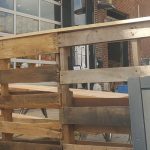Moving into the new multifamily: An interview with Jon Copaken
Like so many industries and businesses across the nation, commercial real estate has taken a few to the chin as a result of the pandemic’s ripple effects. Yet, with a new year and positive vaccine news, a light seems to be appearing at the end of the tunnel. In fact, the NAIOP asked members their opinions about how they view the near future, and overall the response was positive:
“Respondents to the survey report improved rent collection rates, an increase in industrial investment activity, and an improved outlook for employment in their firms. Fewer respondents now expect the pandemic will significantly affect their business operations for more than a year.”
Of course, every sector of commercial real estate has responded differently to the pandemic. With the recent opening of REVERB, which brought a new option for luxury living to the Crossroads, we asked our own Jon Copaken for his take on where the multifamily market in Kansas City stands—and how this “next normal” is changing the tenant experience.
So, how has the approach to multifamily changed?
Right now is all about making residents feel comfortable with their living environment—which often means disinfecting throughout the day, increasing the frequency of third-party cleaning services, and limiting public access to amenities. Overall, it’s about trying to provide as much normalcy to residents as you can safely deliver.
Have amenities changed also?
Virtual group fitness classes have been very popular since the pandemic, and remote “working from home” spaces throughout the community excite a lot of prospects who work from home. Currently, large open spaces meant for entertaining are being used less, but smaller, more isolated spaces can we used for work or virtual schooling.
Offerings like package lockers, keyless access, etc. are now driving the amenity conversation—anything to help streamline processes and reduce face-to-face interactions. In our high-rise and midrise buildings, even simple processes such as holding food and grocery deliveries at the front desk have made an impact.
At REVERB, for example, it was important to focus on creating spaces that could be viewed as an extension of your living space—areas to work from home, to gather and meet with friends and family, and to meet with clients or to host team presentations. In addition, to better embody the Crossroads, we promote the many partnerships we have with local small businesses, such as fitness centers, shops, breweries, and more.
How have multifamily spaces evolved to fit a post-pandemic world?
A sense of community is a crucial amenity not always discussed: Residents crave connections with their neighbors that they used to satisfy by visiting resident events and common spaces. Finding ways to connect with residents through virtual events, social media and other opportunities is a must.
How do you use experiences as amenities?
Fortunately, technology allows for virtual events (happy hours, mixology classes, cooking classes, trivia, bingo, etc.) where residents can still connect and meet their neighbors. “Hallway Happy Hours,” where each resident opens their door and sits outside on their own chair safely distant from their neighbors, are becoming popular. Also important are work-from-home areas and spaces within the community where residents can gather with guests or host virtual events.
What are the best practices for activity programming as we look ahead?
We offer a strong sense of community at REVERB and have found that our residents are all very involved. We’ve offered smaller gatherings at local breweries, virtual cookie decorating classes, happy hours at REVERB Social, and virtual cocktail classes with custom rocks glasses (residents love the small takeaway gift), and have hosted private dinner parties at Corvino. We have a lot of exciting things planned this year!
When we were building REVERB, we had long discussions about amenities and chose to forgo the traditional offerings such as a fitness center and pool. REVERB sits in the heart of the Crossroads, and we wanted to make the neighborhood the amenity—allowing the residents to truly explore their city. So, we instead worked with local partners to launch the REVERB Card, which offers discounts or memberships at local gyms, restaurants, etc.
What are some key lessons you’ve learned from this past year?
Always prepare for constant change. We have to empower our employees to make the right decisions to take care of a resident, instead of bogging them down with checklists and guidelines. We also need to be constantly evolving and reviewing our own best practices. Every day brings new information, and we need to ensure we’re keeping up with changes—always with a focus on resident safety.
This pandemic has allowed us the opportunity to venture outside the box and given us the opportunity to focus on Kansas City as a whole so we can better support our local small businesses. Although we’ve all faced challenges, we can’t help but appreciate the support we have experienced within our Crossroads community and look forward to the continued evolution of multifamily in Kansas City.







